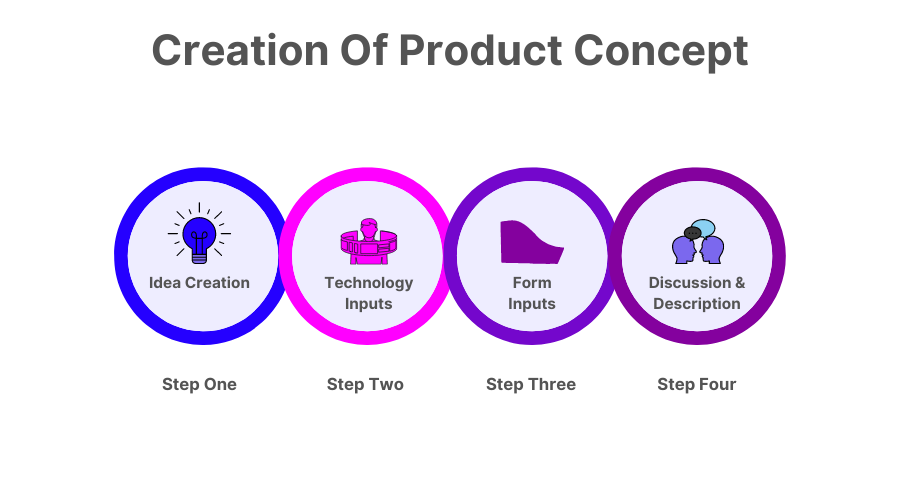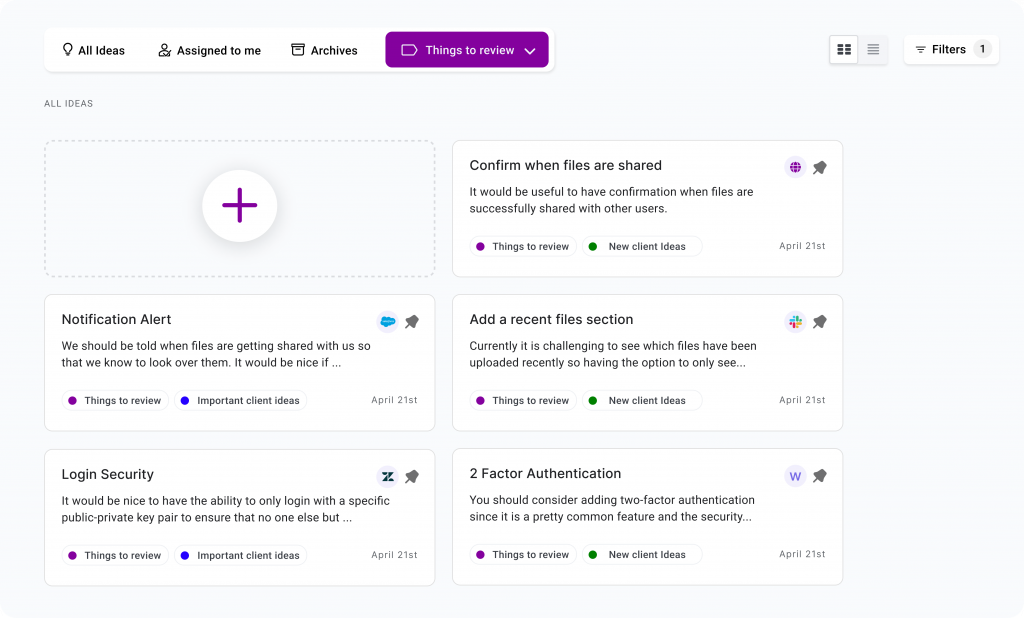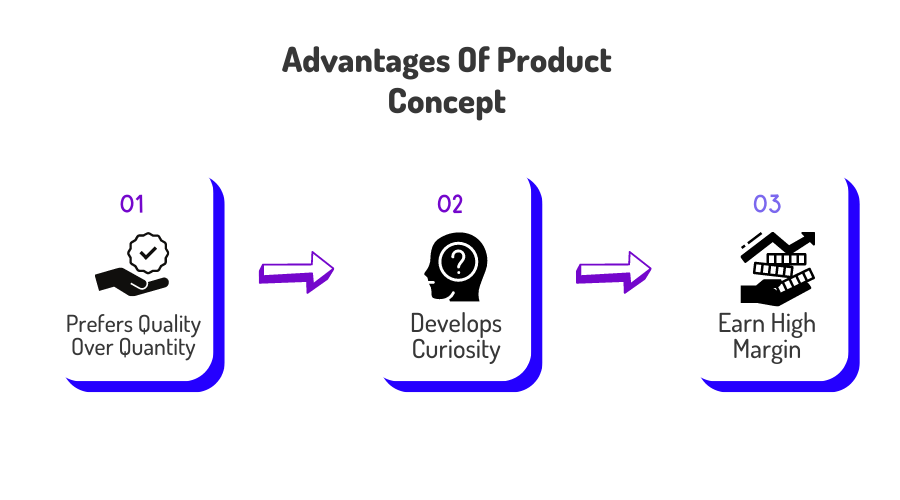Product Concept: Theory, Examples, Importance & Types

This article covers:
- What Is a Product Concept?
- Product Concept Theory
- Product Concept Example
- Product Concept Importance
- What Are the Types of Product Concepts?
- Select a Product Concept
- Product Concept Pros and Cons
- Product Concept Design
- Generate Product Concept
- How Is the Product Concept Different From the Marketing Concept?
- What Are the Advantages and Disadvantages of a Product Concept in Marketing?
What Is a Product Concept?
A product concept is a general idea of the product you want to create or market.
It is an idea that can be changed and improved as time goes by.
A product concept deals with customer needs, business ideas, or technological innovations.
The key to a successful product concept is to find what the customer wants and how they want it.
How do you know what your target customer base wants at the end of the day? Well, you must collect their feedback, ideas, and recommendations and adapt them to your product. The best software for product management can assist you with all of this.
Having this information will guide you to determine if your idea has the potential for success in the marketplace.
In other words, the product concept is the initial idea that leads to developing a new product. When creating a product concept, prioritize security by identifying potential risks and implementing measures such as encryption, access controls, and vulnerability analysis.
The product concept will drive the new product’s design, materials, and marketing.
The product concept includes how customers perceive a product and solve their problems.
It is what differentiates one firm from another in an industry.
Product Concept is a significant step in the product development cycle.
It is the first step of the Concept to Product process, which helps create a product with a clear focus.
The product concept is the vision and roadmap of the product.
It determines what the product is, how it will be, and what it will look like in the future.
Product Concept is a combination of the customer’s needs and expectations.

Product Concept Theory
A product concept is a combination of a product’s name and features.
It’s a vital part of the product because it’s the first thing people will notice about it.
Most successful products and have a large following have a great product concept.
There is usually a debate between product concept vs product ideas. Its important to note that they are both different. Product concept is very detailed or elaborate version of the provided product ideas.
A product concept is also sometimes called a “brand definition.”
It derives this name because the product concept is often the first thing people notice about a product.
If the product concept is confusing or unclear, it will hurt the product.
The theory of product concept is a marketing strategy. You can use it for both new and existing products.
It helps build a new product based on the existing idea.
The basic concept is to build a new product based on the already existing idea, However, it can be challenging to generate product concept.
But the critical questions are:
- How to use it?
- How to build a product concept?
- What are the advantages and disadvantages of the product concept?
Consumers will prefer items with higher quality, performance, and features over low quality as per the product concept theory.
Product Concept Example
Apple is one corporation that places a great value on product concepts. It provides the best products to its customers. Apple does everything right. From the packaging to the logo colors or branding colors all the details matter.
Apple’s products are of exceptional quality, cutting-edge features, and outstanding performance.
Customers get attracted to Apple’s products, which creates a marketing pull.
Other examples could be luxury brands such as Louis Vitton and Gucci.
Louis Vuitton is a French fashion house as well.
Its core items include premium ready-to-wear watches, shoes, clothing, jewelry, eyewear, accouterments, leather products, and books.
Customers appreciate the company’s quality products and will go to great lengths to obtain a Louis Vuitton item.
Excellence, luxury, style, and prestige are more important than fancy clients’ prices.
Gucci is among the most well-known luxury fashion labels in the world.
Quality makeup, purses, readily available clothing, shoes, fragrance, home décor, and various other accessories are available from the brand.
The brand also adheres to the product philosophy by providing customers with the most up-to-date fashionable items.
For Gucci products, people are willing to pay a premium price.
Product Concept Importance
A product concept could be a prototype, a new product, or an improvement of an existing product.
Product concept is important for the following two things:
- Explore the product’s potential
- Develop the idea
The product concept determines the product’s form, function, and target market.
It is an integral part of the design process because it can make or break the success of a product.
The product concept is the backbone of the product design, and it’s the “idea” behind the product.
The concept of the product is unique to every business and every product.
It serves as the best way to understand the product and decide how to proceed with the concept.
Innovating with a product concept ensures functional and added value to existing designs.
The product concept is one of the essential aspects of product strategy.
You run the risk of investing all of your resources in an item that may not have a future.
However, the product concept helps you minimize this risk.
What Are the Types of Product Concepts?
The product concept is a commonly used marketing strategy based on consumers’ preference for products that offer the most:
- Quality
- Performance
- Features
There Are Three Types of Product Concepts:
The Original Product Concept
The original product concept believes that consumers will only buy products that offer high quality, performance, or innovative features than existing products.
Any product that compromises on the quality, performance, and features won’t be an original product concept.
The Augmented Product Concept
The augmented product concept recognizes that consumers want more than just basic features.
In addition to enhanced features, these concepts hold that consumers also want additional benefits such as better services or warranties.
The Potential Product Concept
And this product concept goes beyond the original or augmented ideas.
It includes intangible features and benefits like brand recognition or status.
However, you will rarely see organizations using the product concept anymore.
And that is because it wastes too much money on products that fail in the marketplace.
Most companies use one of these two development approaches:
The Customer Experience Concept
This concept focuses on improving a customer’s experience with the company’s products and services. That is why many companies use product concept in marketing.
The company tries to make its customers’ experiences better by:
- Improving customer support
- Shortening delivery times
- Increasing customization
A customer-experience concept may not add any new features to a product.
Yet, it will improve how people perceive that product.
For example, Apple has improved its customer experience by streamlining its stores and creating an online help system to answer customer queries.
The Process Concept
This product concept focuses on the following two aspects:
- Streamlining manufacturing processes
- Reducing waste during production
Most companies adopt this approach when:
- They have already developed successful products.
- Can focus on process updates to reduce costs and improve quality.
Select a Product Concept
You might have already done your user research and assessed the market to decide what kind of product you want to sell.
However, you are now at a stage where you want to choose which product to sell.
You have cut it down to a few choices. But, which one should you choose?
Selecting a product concept can be challenging, and many factors come into play.
You will have to live with a choice for a long time, and it will be difficult to change later on.
You will have to follow some steps to select a product concept that can bring success to your company.
Preparing the Selection Matrix:
In order to select a product concept, firstly, you can create scoring matrices using a weighted total for the finished designs depending on customer needs.
Evaluating the Ideas:
Each team member has to fill out the weighted concept screening matrix independently. This is an important step to select a product concept.
Sorting the Ideas:
The next step to select a product concept is sorting the ideas.
At this stage, two things are happening simultaneously:
- The team averages the rankings for each notion
- They also examine how each member evaluates each concept
The team performs these tasks for each notion to understand how each team member feels about it.
Teams print out these rankings on a whiteboard.
After which, teams choose a finished on the basis of the following two criteria:
- The team rankings
- Extensive group discussion of the pros and cons of each idea
Combining and Improving the Ideas:
The group then debates whether the ideas can be integrated or improvised.
Picking One or More Ideas:
A concept is chosen based on team rankings and discussions.
And finally, teams need to consider the process and the results.

Product Concept Pros and Cons
When you’re planning to start a business, you’ll probably spend a lot of time thinking about different ideas for your products.
You need to look at two things before you start spending your hard-earned money on your business idea.
- You will have to determine whether the concept is viable.
- Whether people will want to purchase your product or services.
It would be best to ask yourself:
- How to sell your product?
- How much to charge?
- How much do you need to set to make a profit?
You’ll also want to make sure that:
- You’re picking a product that has a limited number of competitors so that you can maximize your profits.
- You’ll want to choose a relatively easy product to manufacture or service.
- You also want to make sure that you don’t spend too much money marketing your product.
If you’re not sure whether you’re picking the right product, you can always hire a business consultant to help you.
Advantages of Product Concept
When it comes to creating a product concept, there are several advantages that you will receive.
There is some paperwork that you will have to do. But there is also a lot to gain from it.
Keep reading if you want to understand the benefits of the concept of product.
First of all, creating a product concept will help you with planning.
You will understand the following:
- Exactly how much money will you need for your product?
- How long will it take to complete it?
- Do you have the experience to construct the product?
Another advantage of creating a product concept is that you will have a clear image of what you will develop.
Having a clear idea makes it easier to start working on the project.
You will also have the resources you will need and know what to do to make everything come together ideally.
The main advantage of the product concept is that it allows you to focus your efforts on differentiating your product from its competitors.
When you create a unique product concept, ensure that your new product will be more popular than your competitors’ products.
But unfortunately, when it comes to product concepts, many things can go wrong.
Many people do not understand the concept of the product even though it is an essential part of creating a product.
The idea of the product is what mainly affects the sales of your product.
But if you have a poor idea of your product, you will have a hard time selling the product.
The idea of your product will directly relate to the price that you are going to charge for your product.
The idea of your product is going to determine the target users of your product.

And so you have to understand the concept of your product if you wish to create a successful product.
You have to create a product that people are going to buy.
Disadvantages of Product Concept
Now lets also dive into some of the downsides of the concept of product.
There are many disadvantages of having a product concept.
The most obvious is that you have to work with a limited budget.
If you have a concept in mind, you can’t just pick up the phone and ask your suppliers to discount a product or service.
You have to stick to the concept and look for suppliers who can provide what you need.
It’s hard to find vendors and even harder to convince them to provide the product or service at a lower price.
Another disadvantage of having a product concept is that you might think you need something you don’t.
Most entrepreneurs think about the product first and then about the market.
But if you do it the other way around, you might save a lot of time and money.
Product Concept Design
The general concept is laid forth during the product concept design phase of development.
Usually the product concept design is well laid down by the team members. This design is roughly outlined in the product concept statement.
You can examine different product components at this stage without going into too much depth. These components include:
- User experience
- Usability
- Styling
- Technology
Generate Product Concept
The following are the steps in developing a product concept:
- Recognizing the problem
- Investigating tested and valid solutions
- Idea generation and brainstorming
- Looking at the thoughts and solutions
- Choosing the winner and getting to work on it
How Is the Product Concept Different From the Marketing Concept?
A product concept is a tool used to define the scope of a product.
In marketing, you determine the product by its marketing concept.
The product concept is what the product is, while the marketing concept is what you sell in the market.
The book “The Concept of the Marketing Mix” describes the marketing concept as the four Ps:
- Product
- Price
- Place
- Promotion
The above pointers seem similar to the product concept.
But the marketing mix is the product concept as defined by the marketer.
The marketing mix is the four Ps, but the product concept is not limited to only four Ps.
The product concept is the foundation of the marketing concept.
What Are the Advantages and Disadvantages of a Product Concept in Marketing?
Advantages:
The product concept in marketing assists the company.
They do this by creating curiosity in customers’ minds because the company adds a distinctive feature with each new launch.
Customers and competitors believe that the company will come up with something new.
Thus the curiosity component will always be present in the customer’s mind.
This component that the company remains in the spotlight.
Companies that apply this marketing strategy can charge a higher price.
The companies can do this even if there are competitors because of only one reason.
The company provides a high-quality product with unique features not found in competing items.
Disadvantages:
The product concept in the marketing method will only work for products or marketplaces in which the cost of the product is irrelevant.
The only thing that matters is quality.
It includes:
- Product
- Services
Another disadvantage of this marketing approach is that some companies cram their products with features.
And these features do not add value to the product.
They only demand a higher price from the customers because of those features.
Putting It All Together
That said, the product concept is an essential element in the business life of any company.
It will allow the following benefits:
- To make the best decisions for the business
- Maximize resources
- Evaluate costs
- Create a strategy for developing a product
What else is required when there are ample benefits to creating a product concept.
